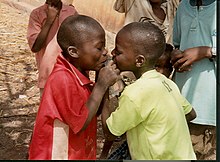User:ETAPx/Water scarcity in Africa
Country or city examples[edit]
Nigeria[edit]
"Nigeria is the most populated black nation in the world with about 199 million people" yet over 86% of Nigerians don't have access to a safe source of drinking water.[1] UNICEF reports that over half of the basic water services that about 70% of Nigerians have access to are contaminated.[2]
Lack of infrastructure throughout Nigeria prevents most communities from having "pipe-borne water" and "only nine litres of water on average is available to a Nigerian daily" [3] Because of this, many Nigerians depend on commercially available water such as sachet water or bottled water. [1]

Polluted and contaminated groundwater supplies contribute to water scarcity in Nigeria. [4] Some major categories of pollutants include fertilizer and agricultural runoff, poor sewage management systems, industrial waste, oil and gas contaminants, mineral mining by-products, and abattoir effluent. [3]
References[edit]
- ^ a b Ighalo, Joshua O.; Adeniyi, Adewale George (2020-12-01). "A comprehensive review of water quality monitoring and assessment in Nigeria". Chemosphere. 260: 127569. doi:10.1016/j.chemosphere.2020.127569. ISSN 0045-6535.
- ^ "Nearly one third of Nigerian children do not have enough water to meet their daily needs - UNICEF". www.unicef.org. Retrieved 2021-09-28.
- ^ a b Federal Ministry of Water Resources (FMWR), Government of Nigeria, National Bureau of Statistics (NBS) and UNICEF. 2020. Water, Sanitation and Hygiene: National Outcome Routine Mapping (WASH NORM) 2019: A Report of Findings. FCT Abuja. Nigeria
- ^ "Water Stress: A Triple Threat in Nigeria". Pacific Council on International Policy. 2019-02-15. Retrieved 2021-10-06.
